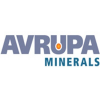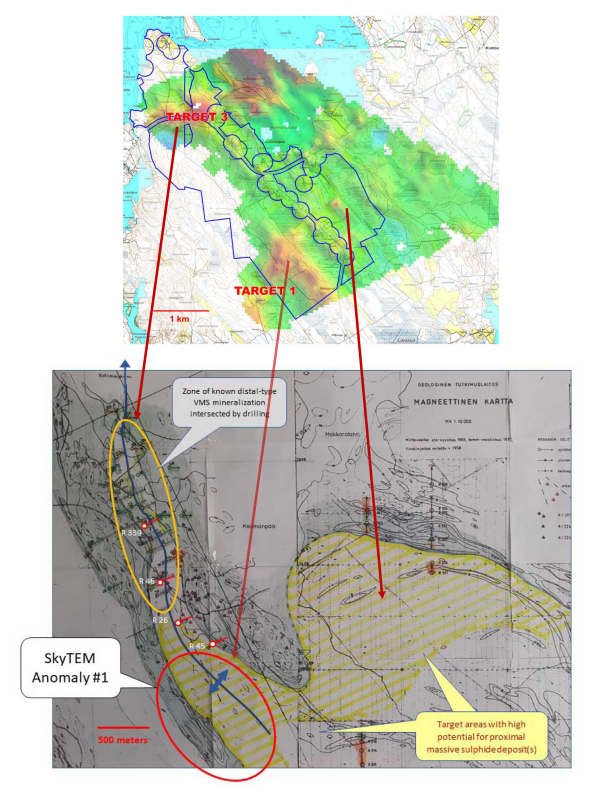Archive
Avrupa Minerals Reports Sampling Results and Progress at Kolima VMS Target, Finland
 | |||||||||
 |  |  | |||||||
-
Sampling and re-logging of four historic drill holes completed;
-
Geochemical results confirm the presence of distal, disseminated VMS-style zinc mineralization, though the source is still unknown;
-
Multi-element, pathfinder geochemistry supports the possibility for proximal, massive VMS-style mineralization within a radius of 5km;
-
Combination of geology, SkyTEM geophysics, and new geochemical results suggest several well-defined target areas for first pass drilling when exploration license is issued.
Vancouver, BC – TheNewswire - June 21, 2022 – Avrupa Minerals Ltd. (TSXV:AVU) (OTC:AVPMF) (FRANKFURT:8AM) is pleased to provide a follow-up progress report covering work related to the Kolima exploration application area in the Pyhäsalmi Mining District, central Finland. Avrupa previously reported on initial work and exploration permit application at Kolima in an earlier news release dated April 12, 2022 (Avrupa Minerals Reports First Progress at Kolima Project).
The Company contracted with the Finland Geological Survey (GTK) to re-log and sample four representative, historic drill holes from the Kolima exploration projects carried out from the mid-1950’s to the early-1980’s by GTK. Re-logging of the four drillholes, totaling 743.55 meters and situated along a 2-kilometer strike length, indicates that predominantly disseminated zinc mineralization is present, for the most part, through long intervals of mixed volcanic and sedimentary rocks that form the core of the district-scale Kärnä Anticline. Holes that were started further to the west in the west limb of the anticline tended to have thicker zones of zinc mineralization, while the southeasternmost hole, collared at the edge of the east limb of the anticline, contained the least amount of target volcano-sedimentary rocks, and thus little zinc mineralization.
Paul W. Kuhn, President and CEO of Avrupa, commented, “Getting a handle on the geology of the Kolima target area, combining that with already-known geophysical targets, and now adding supportive zinc and multi-element geochemistry gives us a clear view as to where to drill when we receive the exploration license. This is a well-thought-out targeting process which utilizes strong corporate knowledge of volcanogenic massive sulfide systems. We are looking forward to completing the application process and getting down to the business of drilling.”
In addition to intervals of disseminated sulfides, detailed logging also revealed the presence of several thin beds of semi-massive to massive sphalerite, zinc sulfide, up to one meter thick, in two of the holes, again suggesting that the representative drilling cut distal deposition portions of a VMS system. Typical VMS pathfinder elements, including iron, manganese, antimony, arsenic, molybdenum, and locally tin, show anomalous results. VMS metals themselves, copper, lead, and silver, are also present locally anomalous levels in the sampled core. Following are the zinc results of interest in the holes, from north to south:
|
HOLE R339 – Drilled from west limb of Kärnä Anticline; total depth of 84.5 meters; 62 samples |
||||
|
From (m) |
To (m) |
Interval (m) |
Zinc (%) |
Notes |
|
29.66 |
29.84 |
0.18 |
2.4 |
Two thin beds of semi-massive sulfide mineralization within a 20-meter interval of mafic tuffs that contain continuously anomalous Zn up to 0.38%@ over one meter |
|
44.13 |
44.27 |
0.14 |
4 |
|
|
63 |
63.15 |
0.15 |
7.8 |
Two thin beds of semi-massive sulfide mineralization within an interval of mineralized mafic tuffs containing 5.95 meters @ 1.3% Zn |
|
65 |
66 |
1 |
4.4 |
|
|
HOLE R46 – Drilled from west limb of Kärnä Anticline; total depth of 297.6 meters; 109 samples |
||||
|
From |
To |
Interval |
Zinc |
Notes |
|
175 |
179 |
4 |
0.3 |
Strongly anomalous zones of disseminated to weakly bedded sulfide mineralization in mixed tuffs, sediments, and mafic porphyry rocks within a total intercept of disseminated zinc mineralization beginning at a depth of 175 meters and continuing to 281.9 meters. Values range from 100's of ppm zinc to more than 1% over 1 to 4 meters thickness. |
|
205 |
243.3 |
38.3 |
0.2 |
|
|
254 |
268.7 |
14.7 |
0.6 |
|
|
254 |
258 |
4 |
1.4 |
|
|
272 |
281.9 |
9.9 |
0.2 |
|
|
HOLE R26 – Drilled from crest of Kärnä Anticline; total depth of 151.45 meters; 70 samples |
||||
|
From |
To |
Interval |
Zinc |
Notes |
|
21 |
29 |
8 |
0.3 |
Visible disseminated sulfides throughout both zones of mixed tuffs and sediments at the bottom of the interval |
|
39.4 |
69 |
29.6 |
0.2 |
|
|
Hole R25 – Drilled from east limb of Kärnä Anticline; total depth of 210 meters; 20 samples |
||||
|
From |
To |
Interval |
Zinc |
Notes |
|
no significant zinc values |
||||
Table 1. Results of sampling of disseminated zinc mineralization at Kolima along the Kärnä Anticline. It is encouraging to observe the widespread, disseminated to thin-layered zinc mineralization in mixed volcanics and sedimentary rocks suggesting a distal VMS facies depositional environment. Indicator element anomalism, including iron, manganese, antimony, arsenic, molybdenum, and locally tin, also suggest distal facies VMS mineralization. Locally anomalous values of silver (up to 41.2 g/t over one meter), copper (up to 895 ppm over one meter), and lead (up to 0.39% over four meters) further support the possibility of nearby VMS mineralization.
Figure 1. Outline of Kolima exploration license application (in blue) overlain on VTEM results displaying two important close-to-surface conductors.
Figure 2. Historic geophysical map with geology, drillhole locations, main SkyTEM conductors, location of the Kärnä Anticline (in blue), and overall permissive target area (yellow bands). Base map from GTK work from late-1950’s through mid-1980’s.
Results of the work to date are positive, and detailed review of all information vectors to the possible presence of a base metal-rich massive sulfide system at Kolima.
-
Best potential lies along the west limb of the Kärnä anticline, particularly to the south of historic drilling in the area of SkyTEM Anomaly #1 (located within red oval in Figure 2).
-
Further potential lies in the northern sector around and southeast of SkyTEM Anomaly #3 from drill collars to be located to the west of historic drilling and aimed beneath the old holes (located within yellow oval in Figure 2).
-
Combination of all results suggests the possibility of a strong VMS system within a general target zone of five kilometers along the Kärnä Anticline.
-
At this point, regional geophysics may indicate further potential of favorable stratigraphy located to the northeast of SkyTEM Anomaly #1 between the east limb of the Kärnä Anticline and village of Kolima. There is no known historic drilling in this area (represented by yellow banded area).
Avrupa Minerals Ltd. is a growth-oriented junior exploration and development company directed to discovery of mineral deposits, using a hybrid prospect generator business model. The Company holds one 100%-owned license in Portugal, the Alvalade VMS Project, presently optioned to Sandfire MATSA in an earn-in joint venture agreement. The Company now holds one 100%-owned exploration license covering the Slivova gold prospect in Kosovo, and is actively advancing four prospects in central Finland through the recently-announced acquisition of Akkerman Finland Oy. Avrupa focuses its project generation work in politically stable and prospective regions of Europe, presently including Portugal, Finland, and Kosovo. The Company continues to seek and develop other opportunities around Europe.
For additional information, contact Avrupa Minerals Ltd. at 1-604-687-3520 or visit our website at www.avrupaminerals.com.
Paul W. Kuhn, President & Director
This news release was prepared by Company management, who take full responsibility for its content. Paul W. Kuhn, President and CEO of Avrupa Minerals, a Licensed Professional Geologist and a Registered Member of the Society of Mining Engineers, is a Qualified Person as defined by National Instrument 43-101 of the Canadian Securities Administrators. He has reviewed the technical disclosure in this release. Mr. Kuhn, the QP, has not only reviewed, but prepared and supervised the preparation or approval of the scientific and technical content in the news release.
Neither TSX Venture Exchange nor its Regulation Services Provider (as that term is defined in the policies of the TSX Venture Exchange) accepts responsibility for the adequacy or accuracy of this release.
